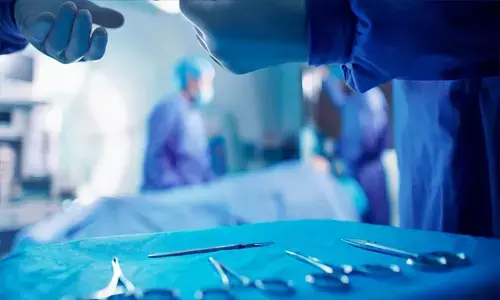- Home
- Medical news & Guidelines
- Anesthesiology
- Cardiology and CTVS
- Critical Care
- Dentistry
- Dermatology
- Diabetes and Endocrinology
- ENT
- Gastroenterology
- Medicine
- Nephrology
- Neurology
- Obstretics-Gynaecology
- Oncology
- Ophthalmology
- Orthopaedics
- Pediatrics-Neonatology
- Psychiatry
- Pulmonology
- Radiology
- Surgery
- Urology
- Laboratory Medicine
- Diet
- Nursing
- Paramedical
- Physiotherapy
- Health news
- Fact Check
- Bone Health Fact Check
- Brain Health Fact Check
- Cancer Related Fact Check
- Child Care Fact Check
- Dental and oral health fact check
- Diabetes and metabolic health fact check
- Diet and Nutrition Fact Check
- Eye and ENT Care Fact Check
- Fitness fact check
- Gut health fact check
- Heart health fact check
- Kidney health fact check
- Medical education fact check
- Men's health fact check
- Respiratory fact check
- Skin and hair care fact check
- Vaccine and Immunization fact check
- Women's health fact check
- AYUSH
- State News
- Andaman and Nicobar Islands
- Andhra Pradesh
- Arunachal Pradesh
- Assam
- Bihar
- Chandigarh
- Chattisgarh
- Dadra and Nagar Haveli
- Daman and Diu
- Delhi
- Goa
- Gujarat
- Haryana
- Himachal Pradesh
- Jammu & Kashmir
- Jharkhand
- Karnataka
- Kerala
- Ladakh
- Lakshadweep
- Madhya Pradesh
- Maharashtra
- Manipur
- Meghalaya
- Mizoram
- Nagaland
- Odisha
- Puducherry
- Punjab
- Rajasthan
- Sikkim
- Tamil Nadu
- Telangana
- Tripura
- Uttar Pradesh
- Uttrakhand
- West Bengal
- Medical Education
- Industry
Normal saline prevents urethrorectal fistulas after prostate cryoablation: Study

China: In a new study conducted by Ning Wang and colleagues, it was shown that normal saline (NS) injection can be used to increase the anterior perirectal space following cryoablation surgery which might prevent urethrorectal fistulas, especially for individuals with localized prostate cancer (PCa) who had longer biochemical progression-free survival (bPFS) and lower prostate-specific antigen (PSA) nadir levels.
The purpose of this study is to explain the procedure and assess the therapeutic benefit of using normal saline injection to increase the anterior perirectal space in prostate cancer patients undergoing prostate cryoablation. The findings of this study were published in the European Journal of Surgical Oncology.
The study involved patients with PCa who had cryoablation between August 2014 and December 2019. Patients with localized PCa who had cryoablation as their main form of therapy had their prostate-specific antigen nadir and biochemical progression-free survival evaluated.
The key findings of this study were as follows:
1. There were 159 PCa patients altogether.
2. The median (interquartile range) length of the estimated ice ball edge well beyond the prostatic capsule among 147 individuals having the data of anterior perirectal space was 8.3 mm.
3. There were no occurrences of urethrorectal fistula recorded; nevertheless, 25 patients had scrotal edema and 29 patients had urine retention.
4. Within 7 weeks of surgery, all side effects below Clavien-Dindo grade IIIb subsided.
5. Six individuals reported having urinary incontinence. The median follow-up period was 56.5 months for patients with localized PCa.
6. The predicted 5-year bPFS for PCa patients was 82.3% overall, 82.8% for patients with low to intermediate risk, and 82.1% for patients with high risk.
7. The median (IQR) PSA nadir for the 52 patients who underwent sole cryoablation was 0.147 (0.027-0.381) ng/mL.
Reference:
Wang, N., Zhao, D., Chen, D., Wu, Z., Wang, Y., Yang, Z., Zhao, J., Zhou, F., & Li, Y. (2022). Clinical value of normal saline injection for expansion of the anterior perirectal space during prostate cryoablation. In European Journal of Surgical Oncology. Elsevier BV. https://doi.org/10.1016/j.ejso.2022.06.032
Neuroscience Masters graduate
Jacinthlyn Sylvia, a Neuroscience Master's graduate from Chennai has worked extensively in deciphering the neurobiology of cognition and motor control in aging. She also has spread-out exposure to Neurosurgery from her Bachelor’s. She is currently involved in active Neuro-Oncology research. She is an upcoming neuroscientist with a fiery passion for writing. Her news cover at Medical Dialogues feature recent discoveries and updates from the healthcare and biomedical research fields. She can be reached at editorial@medicaldialogues.in
Dr Kamal Kant Kohli-MBBS, DTCD- a chest specialist with more than 30 years of practice and a flair for writing clinical articles, Dr Kamal Kant Kohli joined Medical Dialogues as a Chief Editor of Medical News. Besides writing articles, as an editor, he proofreads and verifies all the medical content published on Medical Dialogues including those coming from journals, studies,medical conferences,guidelines etc. Email: drkohli@medicaldialogues.in. Contact no. 011-43720751


